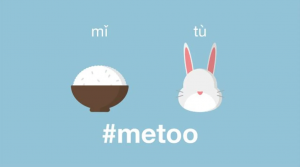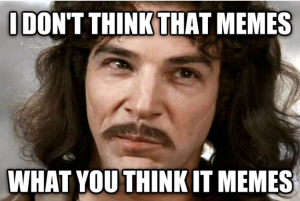This article was written for the Advanced Writing for Media course, part of the JMC major, given by Prof. Laura Kelly. Read Greti’s thoughts on the meme cultural and the research she has done on it below.
This particular scene from Toy Story 2 has transcended the success of the cartoon it came from thanks to it being “meme material”. On it Buzz Lightyear (on the right) excitedly shows something to the concerned Woody (on the left). The image, accompanied by different text, depending on the context of the meme, is used to describe or ridicule a situation in which there is too much of something. In this case, societal problems.
Did you notice how long it took me to describe the context and for you to read it? While scrolling through social media, though, getting familiar with the context and the situation takes probably less than a second. The interpretation is followed by a smile or a chuckle, and up to the next post. Even though we do not really pay too much conscious attention to those silly pictures with Impact font, they do have some impact on our relationships, mental health and the way we view the world around us. And I am optimistic enough to believe that this impact can be beneficial for our society.
Let’s take for example the Buzz and Woody meme — wars, pandemic, gender inequality, our society is truly full of problems on a worldwide scale. We are going through similar things no matter from which corner of the planet we are interacting with the meme, and that brings us together, because we relate to each other. It is a nice reminder that we are not alone either in times of struggle, or in positive moments.
The Internet facilitates forming virtual spaces based on ideas, interests, belonging to certain communities or sub-cultures. Ryan Milner, assistant professor of Communications at the College of Charleston and author of the book The World Made Meme, dives further into the topic of memes bringing people together.
“So you get that element of one, not only sharing experiences, but also two, saying we share this experience that other people don’t share. So there’s a lot of comradery and sociality in that,” he says.
The relatableness of the memes also makes them beneficial for people struggling with their mental health, exactly because memes can provide the creation of social and emotional bonds with people going through the same struggle. What is more, “they are perceived to facilitate a humorous take on a negative experience and situation,” and to “facilitate the expression of difficult emotions in a novel and creative way,” according to the National Library of Medicine.
A Penn State research on the psychological effects of memes during the pandemic also suggests that viewing memes about a stressful event, such as COVID-19, can improve our mood and make coping with the situation a bit easier. One of the conductors of the research, Jessica Myrick, professor of media studies at the Donald P. Bellisario College of Communications, says that “it will take a lot more than a few cats to lower our stress about a pandemic.” Still, the findings indicate that “if you viewed memes, you were in a better mood which made you feel more confident in your ability to cope with life during the pandemic.”
Apart from that, memes are an effective form of social commentary, because they catalyze conversations, based on the freedom of expressing our opinions without repercussions. The topics may vary from the young age of Leonardo DiCaprio’s girlfriends, which sparked a discourse on social media about grooming and pedophilia, to giving voice of the women in China through the “Rice bunny”, which became an emblem of the #MeToo movement there. It is a way to establish and strengthen new societal norms and to challenge outdated understandings or to present the wrongdoings of an important figure in a humorous way.

Even though memes overall have a relatable and funny nature, are beneficial for the mental wellbeing and offer a safe expression of thoughts and opinions, they can be abused for malicious intents if we let them affect us. It is true that some people create memes to spread propaganda and mis- or disinformation about serious relevant issues, due to their great emotional impact and lightning speed spread. However, applying critical thinking to the posts we see, having a hygiene of the social media we consume and not reacting too emotionally to everything, are always good practices to have while scrolling through the Internet. That way we can have a much more safe and enjoyable time while also appreciating those silly pictures with Impact font and reinforcing their positive side.






